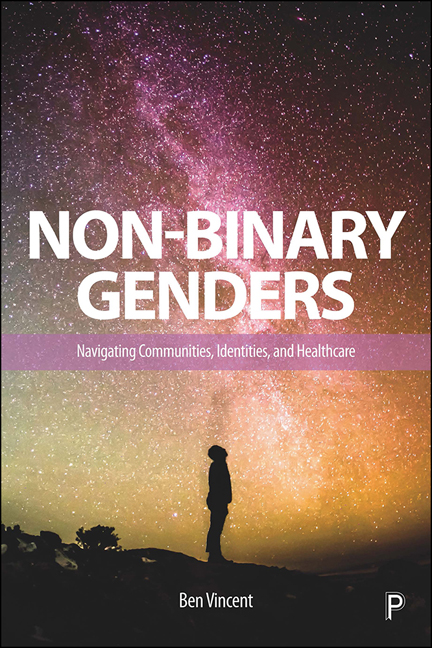Book contents
- Frontmatter
- Dedication
- Contents
- List of Figures and Tables
- Notes on the Author
- Acknowledgements
- Introduction
- 1 Reviewing Non-Binary: Where have we Come From?
- 2 Doing and Being: My Relationship with this Work, and how it was Done
- 3 ‘Not Trans Enough’: The Relationship Between Non-Binary Gender Identities, Uncertainty and Legitimacy
- 4 Non-Binary Times, Non-Binary Places: Communities and their Intersections
- 5 Views of the Clinic: Non-Binary Perceptions and Experiences of General Healthcare Services
- 6 A Strong Motivation to Tick The Boxes: Non-Binary Perceptions and Experiences of Gender Identity Clinics
- Conclusion
- References
- Index
5 - Views of the Clinic: Non-Binary Perceptions and Experiences of General Healthcare Services
Published online by Cambridge University Press: 10 March 2021
- Frontmatter
- Dedication
- Contents
- List of Figures and Tables
- Notes on the Author
- Acknowledgements
- Introduction
- 1 Reviewing Non-Binary: Where have we Come From?
- 2 Doing and Being: My Relationship with this Work, and how it was Done
- 3 ‘Not Trans Enough’: The Relationship Between Non-Binary Gender Identities, Uncertainty and Legitimacy
- 4 Non-Binary Times, Non-Binary Places: Communities and their Intersections
- 5 Views of the Clinic: Non-Binary Perceptions and Experiences of General Healthcare Services
- 6 A Strong Motivation to Tick The Boxes: Non-Binary Perceptions and Experiences of Gender Identity Clinics
- Conclusion
- References
- Index
Summary
Those who identify ‘beside’ the gender binary will still be situated within it by others whose worldviews are bounded by the discourse of binary gender, such that it is impossible to escape this discursive framework altogether. (Sanger, 2008: 50)
Introduction
This and the following chapter will focus on non-binary perceptions of healthcare in the UK. In this chapter, I address primary care services for the most part (with some mention of secondary care), focusing on both the views and experiences participants reported of interactions with doctors and other staff, such as nurses and administrators. Secondary care practitioners whose fields are unrelated to gender transition will have, on average, similar knowledge of trans healthcare needs as primary care practitioners. Such discussions are addressed within this chapter. Further, the motivation for a non-binary service user to access secondary care may be very broad, the same as with cisgender service users. This is not the case when a secondary care service has been accessed, for example, on the advice or referral from a gender identity clinic (GIC). Secondary care services that are routinely used as a consequence of GIC access (such as some endocrinologists and psychiatrists) will have experience and approaches in closer alignment to tertiary care gender specialists. Therefore, these medical experiences are addressed in Chapter 6.
I begin this chapter by considering how participants judged the nonbinary community's overall view of care when going to a GP. This is followed by specific accounts and examples of individual's experiences of primary care, for appointments not related to gender transition. This begins with experiences of ‘gendered medicine’ – healthcare which is differentiated in gendered terms, such as smear tests. This is followed by generalisable healthcare experiences, such as arm pain. Some experiences resonate strongly with binary-oriented trans experiences of primary care (Feldman and Goldberg, 2006; Dewey, 2008). Responses from doctors to patients that may be ideal for a binaryoriented trans person may or may not work for a non-binary patient. Some participants discussed positive views of general medical practice, while simultaneously reporting an overall negative and guarded sense regarding medical practice in gender-diverse communities.
- Type
- Chapter
- Information
- Non-Binary GendersNavigating Communities, Identities, and Healthcare, pp. 133 - 168Publisher: Bristol University PressPrint publication year: 2020



